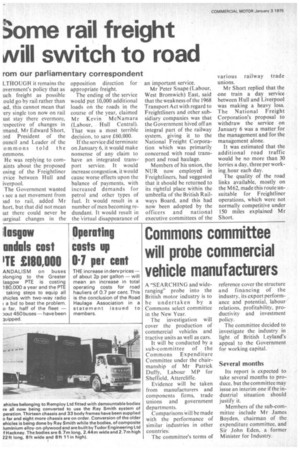5ome rail freight Nil switch to road
Page 14

If you've noticed an error in this article please click here to report it so we can fix it.
rom our parliamentary correspondent
LTHOUGH it remains the overnment's policy that as uch freight as possible ould go by rail rather than ad, this cannot mean that • ery single ton now on rail ust stay there evermore, -espective of changes in :mand, Mr Edward Short, Drd President of the ouncil and Leader of the ommons told the ommons.
He was replying to cornaints about the proposed osing of the Freightliner rvice between Hull and iverpool.
The Government wanted ■ see a net movement from )ad to rail, added Mr hort, but that did not mean tat there could never be larginal changes in the opposition direction for appropriate freight.
The ending of the service would put 10,000 additional loads on the roads in the course of the year, claimed Mr Kevin McNamara (Labour, Hull Central). That was a most terrible decision, to save £60,000.
If the service did terminate on January 6, it would make nonsense of any claim to have an integrated transport service. It would increase congestioR, it would cause worse effects upon the balance of payments, with increased demands for petrol and other types of fuel. It would result in a number of men becoming redundant. It would result in the 'virtual disappearance of an important service.
Mr Peter Snape (Labour, West Bromwich) East, said that the weakness of the 1968 Transport Act with regard to Freightliners and other subsidiary companies was that the Government hived off an integral part of the railway system, giving it to the National Freight Corporation which was primarily concerned with road transport and road haulage.
Members of his union, the NUR now employed in Freightliners, had suggested that it should be returned to its rightful place within the umbrella of the British Railways Board, and this had now been adopted by the officers and national executive committees of the various railway trade unions.
Mr Short replied that the one train a day service between Hull and Liverpool was making a heavy loss. The National Freight Corporation's proposal to withdraw the service on January 6 was a matter for the management and for the management alone.
It was estimated that the additional road traffic would be no more than 30 lorries a day, three per working.hour each day.
The quality of the road links available, mostly on the M62, made this route unsuitable for Freightliner operations, which were not normally competitive under 150 miles explained Mr Short.












































































